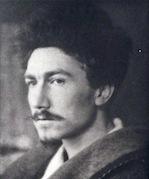POUND, EZRA [LOOMIS] (1885-1972). Ezra Pound was born in Hailey, Idaho. As an expatriate living in Europe, Pound’s experiments with translation and poetic form resulted in his vivid translation of the eighth-century Anglo-Saxon poem “The Seafarer” (1911) and in the imagist style of his long poem, the Cantos (1970). The Cantos juxtaposes precise, but dissimilar, images under the premise that the interaction between them will help create meaning. Some of these images take just half of a poetic line to deliver; others take many pages. For this reason, the Cantos is variously called obscure, incoherent, or a masterpiece of the twentieth century.
The Cantos takes the epic sea traveler Odysseus as its recurring protagonist as he navigates vast seas of philosophy, history, literature, and even politics. The poem begins with Odysseus traveling to the underworld to meet the dead soothsayer Tiresias. Tiresias tells Odysseus, just as he did in Homer’s Odyssey, that he will return home over dark seas, losing all companions. But Pound’s Odysseus never returns, and Pound never finishes his poem. Nevertheless, the Cantos sets out upon a tremendous journey through time, with particularly long stops in medieval China, colonial America, and modern Europe.
During the literary journey of the Cantos, Pound simply touches upon a few details of any one of the given subjects that he treats, then changes subjects. He models this approach, in part, on what he knows of the sailing technique of Hanno, ancient Carthaginian sailor who explored uncharted waters by always keeping in rough relation to whatever shoreline was available. Pound likewise changes the points of topical reference as his images unfold–“in periplum,” a phrase taken from periplus, the Greek term for the standard navigational technique used in the ancient world.
Pound’s advocacy of fascism during World War II resulted in his imprisonment outside Pisa, Italy. His experiences of fear, lament, and regret in Pisa led to a mental breakdown. During some of his most trying personal moments, he calls out through his Cantos to Kuanon, Chinese goddess of Mercy and patron deity to those who travel by sea.
“The Seafarer” (1911)
The Cantos
keywords: male

